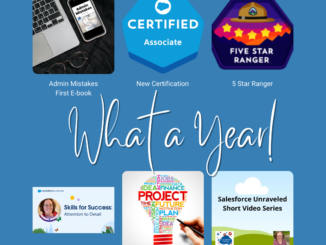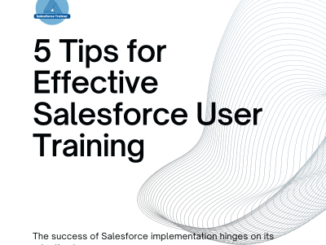As a Salesforce Trainer and Consultant, I understand the significance of technical skills and knowledge in the industry. However, it’s equally crucial to develop and refine your soft skills, particularly effective communication. In this blog post, we will explore tips, tools, and guidance to help you enhance your communication skills and thrive. Whether you’re an administrator or developer, starter or experienced, effective communication will set you apart and contribute to your professional success.
- Active Listening: Active listening is the foundation of effective communication. Especially in today’s world of many meetings being help over Zoom / Teams or equivalant tools, it is a challenge to stay focussed throughout.
Follow these practices to become a better listener:
- Give your undivided attention: Focus on the speaker and maintain eye contact.
- Avoid interrupting: Allow the speaker to finish their thoughts before responding.
- Ask clarifying questions: Seek clarification to ensure you understand the speaker’s message.
- Reflect and paraphrase: Repeat or summarize the speaker’s points to show understanding.

- Clear and Concise Messaging: When conveying information, clarity is key. Some of the actions we take based on received information from our clients can be quite impactfull on the future performance of the business or the project you are working on. It’s important to be unambiguos in your communication. Consider the following tips:
- Structure your message: Organize your thoughts logically and present information in a clear manner.
- Use simple language: Avoid jargon and technical terms when communicating with non-technical audiences.
- Be concise: Deliver your message succinctly, focusing on the key points.
- Provide examples and visuals: Utilize visuals or real-life examples to enhance understanding and engagement.
- Empathy and Emotional Intelligence: Developing empathy and emotional intelligence will enable you to connect with others on a deeper level. As a Salesforce Expert we are often a bit further away from day to working practices for our users. It is important to always bear in mind that what we do is not for our benefit, but for our users benefit. Consider these practices:
- Put yourself in others’ shoes: Understand the perspectives and emotions of your audience.
- Show understanding and respect: Validate others’ feelings and opinions, even if you disagree.
- Adapt your communication style: Tailor your communication approach to the preferences and needs of your audience.
- Manage conflicts constructively: Address conflicts with empathy, focusing on finding solutions rather than escalating tension.
- Non-Verbal Communication: Remember that communication is not just verbal; non-verbal cues play a significant role as well:

- Body language: Pay attention to your posture, gestures, and facial expressions, ensuring they align with your message.
- Eye contact: Maintain appropriate eye contact to establish trust and show attentiveness.
- Tone of voice: Modulate your tone to convey the intended meaning and emotion behind your words.
- Use visual aids: Incorporate visuals, such as slide presentations or diagrams, to support your verbal communication.
- Written Communication: In addition to verbal communication, written communication skills are vital in the Salesforce industry. Where possible, support your written communication with graphs, diagrams or any graphical representation of what you are trying to achieve. It is amazing how something can be made clear by a simple flow diagram. Consider these tips other tips to help your writing:
- Use proper grammar and punctuation: Ensure your written content is error-free and easy to comprehend.
- Structure your writing: Organize your thoughts into paragraphs with clear headings and subheadings.
- Tailor your message: Adapt your writing style to the intended audience, whether it’s a client, team member, or executive.
- Proofread and edit: Review your written work to eliminate typos, improve clarity, and enhance overall quality.
As a Salesforce Expert, effective communication is a crucial skill that will enhance your training and consulting abilities, strengthen client relationships, and drive your professional growth. By actively listening, delivering clear messages, empathizing with others, leveraging non-verbal cues, and honing your written communication skills, you will excel in your role and contribute to the success of your clients and teams. Continually invest in developing your communication skills, and you will establish yourself as a trusted and influential Salesforce professional.
Remember, effective communication is a lifelong journey of learning and improvement.
As a Salesforce expert, you should possess a range of soft skills that complement your technical expertise. I have created a range of blogs to cover some important soft skills for a Salesforce expert. The topics you can expect to be covered in this range:
– Mastering Effective Communication
– Mastering Problem-solving
– Thriving Through Adaptability
– Cultivating Empathy
– Mastering Time management
– Mastering Collaboration
– Developing Analytical thinking
– Elevating Customer service
– The Power of Continuous learning





Be the first to comment